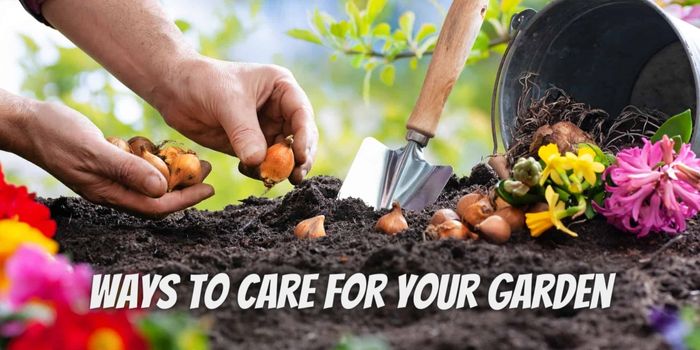Ways to Care for Your Garden

Gardens are living and dynamic spaces that require ongoing care and attention to thrive. Whether you have a small backyard garden or a sprawling landscape, proper care is essential to ensure your plants flourish and your outdoor space remains beautiful and tranquil. We will investigate diverse ways to care for your garden, from soil management to pest control and everything in between.
Soil Health and Maintenance
The cornerstone of a thriving garden lies within the soil beneath it. Soil health and maintenance are paramount to ensure that your garden flourishes. Regular soil testing is an essential starting point, enabling you to gauge its pH level and nutrient content. This knowledge empowers you to tailor your gardening practices and select the most suitable plants for your soil type. Depending on your soil test results, you may need to enrich it with organic matter, such as nutrient-rich compost or well-rotted manure. This amendment improves the soil’s fertility and structure, providing an ideal foundation for plant growth. Please don’t overlook the value of mulching; it retains moisture, moderates temperature fluctuations, and suppresses weed growth. By nurturing your soil, you set the stage for a healthy and bountiful garden.
Proper Watering Techniques
Water is a precious resource, and how you manage it in your garden significantly impacts plant health. Establishing a well-thought-out watering routine is critical. Consider your plants’ specific needs, including plant type, soil composition, and local climate conditions. Deep watering, which involves infrequent but thorough watering, encourages plants to develop deep root systems, making them more resilient during dry spells. Utilizing soaker hoses or drip irrigation systems ensures efficient water delivery directly to the root zone, reducing wastage through evaporation or runoff. Employing mulch not only helps retain soil moisture but also decreases the frequency of watering. Mastering the art of proper watering gives your garden the hydration it needs while conserving water resources.
Pruning and Deadheading
Pruning and deadheading are horticultural practices that serve your garden’s functional and aesthetic purposes. Pruning involves trimming overgrown or damaged branches selectively to enhance air circulation, reduce disease risk, and stimulate new growth. Proper pruning can also shape plants for improved visual appeal. Deadheading, however, entails removing spent flowers, encouraging continuous blooming in many flowering plants. Eliminating spent blossoms redirects the plant’s energy away from seed production, promoting further flowering. Additionally, don’t hesitate to thin overcrowded seedlings in your vegetable garden to ensure proper spacing and healthier growth. Pruning and deadheading are potent tools for maintaining the health and beauty of your garden.
Pest and Disease Management
Pests and diseases can quickly jeopardize the well-being of your garden. Integrated pest management (IPM) is a sustainable approach to these challenges. Start by regularly inspecting your plants for signs of pest infestations or disease symptoms. Early detection allows for timely intervention, reducing potential damage. Encourage beneficial insects like ladybugs, lacewings, and parasitic wasps, which prey on garden pests and help maintain a balanced ecosystem. Explore companion planting, strategically placing certain crops together to deter pests; for example, marigolds can repel nematodes, and basil can discourage aphids. Employ organic pest control methods, such as neem oil, diatomaceous earth, or homemade garlic and pepper sprays, to combat pests while minimizing harm to beneficial insects. Additionally, consider selecting plant varieties known for their resistance to common local diseases.
Fertilization
Fertilization is critical to garden care, ensuring your plants receive the essential nutrients required for robust growth and development. Opt for balanced, slow-release fertilizers that provide a consistent supply of nutrients over time. Follow recommended fertilizer rates and application guidelines tailored to your specific plants, avoiding overfertilization that can harm plants and pollute the environment. Organic options, such as compost or well-rotted manure, offer a natural means of enriching the soil and nurturing your plants. Mastering the art of fertilization gives your garden the nutrients it craves for sustained vitality and vibrancy.
Weed Control
Weeds can stifle your garden’s potential by competing with cultivated plants for vital resources like water and nutrients. Effectively managing weeds is essential. Employ mulching, which blocks sunlight and prevents weed seeds from germinating—hand-pull weeds regularly, especially when young and before they set seed, to prevent their spread. Weed fabric or landscape fabric can serve as an additional barrier beneath mulch to suppress weed growth. A proactive approach to weed control ensures that your garden plants have the best chance to thrive without the stifling competition of unwanted invaders.
Caring for your garden is a multifaceted task that involves soil management, proper watering, pruning, pest and disease control, fertilization, weed control, garden design, cleanup, and seasonal adjustments. By following these guidelines and continuously expanding your gardening knowledge, you can create and maintain a beautiful and thriving garden that brings joy and satisfaction year after year. Remember that gardening is not just a chore; it’s a fulfilling and rewarding hobby that allows you to connect with nature and enjoy the beauty of the outdoors. If you want to transform your backyard oasis, discover the best garden centers in Portland for expert advice and top-quality plants.





